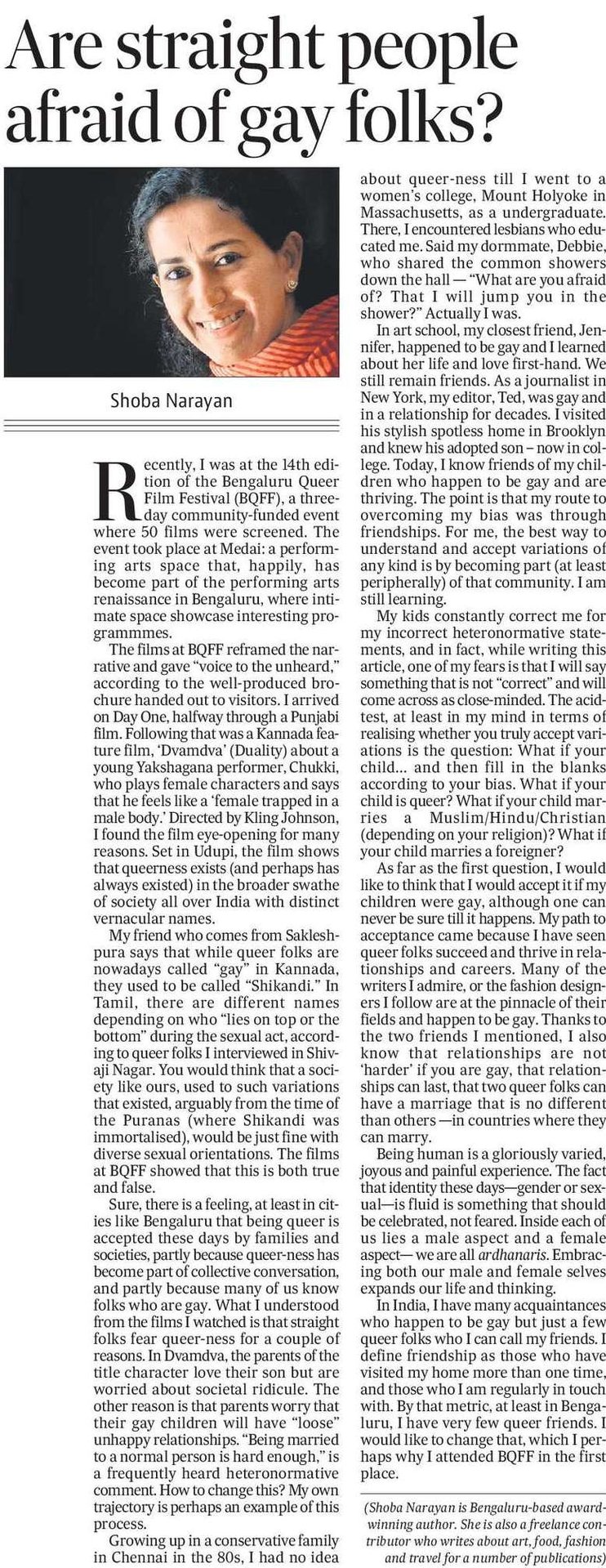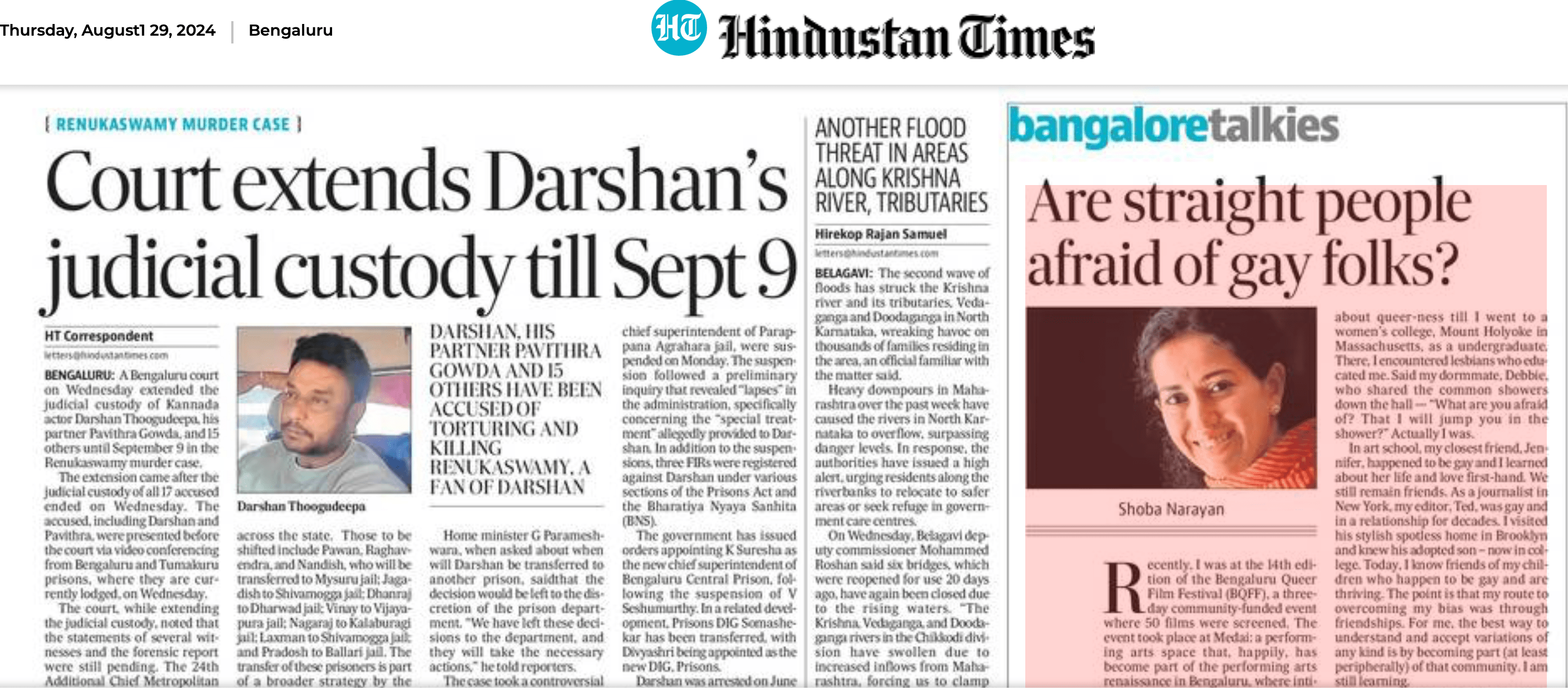Recently, I was at the 14th edition of the Bengaluru Queer Film Festival (BQFF), a three-day community-funded event where 50 films were screened. The event took place at Medai: a performing arts space that, happily, has become part of the performing arts renaissance in Bangalore, where intimate space showcase interesting programs. The films at BQFF reframed the narrative and gave “voice to the unheard,” according to the well-produced brochure handed out to visitors. I arrived on Day One, halfway through a Punjabi film. Following that was a Kannada feature film, Dvamdva (Duality) about a young Yakshagana performer, Chukki, who plays female characters and says that he feels like a ‘female trapped in a male body.’ Directed by Kling Johnson, I found the film eye-opening for many reasons. Set in Udupi, the film shows that queerness exists (and perhaps has always existed) in the broader swathe of society all over India with distinct vernacular names.
My friend who comes from Sakleshpura says that while queer folks are nowadays called “gay” in Kannada, they used to be called “Shikandi.” In Tamil, there are different names depending on who “lies on top or the bottom” during the sexual act, according to queer folks I interviewed in Shivaji Nagar. You would think that a society like ours, used to such variations that existed, arguably from the time of the Puranas (where Shikandi was immortalised), would be just fine with diverse sexual orientations. The films at BQFF showed that this is both true and false.
Sure, there is a feeling, at least in cities like Bengaluru that being queer is accepted these days by families and societies, partly because queer-ness has become part of collective conversation, and partly because many of us know folks who are gay. What I understood from the films I watched is that straight folks fear queer-ness for a couple of reasons. In Dvamdva, the parents of the title character love their son but are worried about societal ridicule. The other reason is that parents worry that their gay children will have “loose” unhappy relationships. “Being married to a normal person is hard enough,” is a frequently heard heteronormative comment. How to change this? My own trajectory is perhaps an example of this process.
Growing up in a conservative family in Chennai in the 80s, I had no idea about queer-ness till I went to a women’s college, Mount Holyoke in Massachusetts, as a undergraduate. There, I encountered lesbians who educated me. Said my dorm-mate, Debbie, who shared the common showers down the hall — “What are you afraid of? That I will jump you in the shower?” Actually I was.
In art school, my closest friend, Jennifer, happened to be gay and I learned about her life and love first-hand. We still remain friends. As a journalist in New York, my editor, Ted, was gay and in a relationship for decades. I visited his stylish spotless home in Brooklyn and knew his adopted son – now in college. Today, I know friends of my children who happen to be gay and are thriving. The point is that my route to overcoming my bias was through friendships. For me, the best way to understand and accept variations of any kind is by becoming part (at least peripherally) of that community. I am still learning. My kids constantly correct me for my incorrect heteronormative statements, and in fact, while writing this article, one of my fears is that I will say something that is not “correct” and will come across as close-minded. The acid-test, at least in my mind in terms of realising whether you truly accept variations is the question: What if your child… and then fill in the blanks according to your bias. What if your child is queer? What if your child marries a Muslim/Hindu/Christian (depending on your religion)? What if your child marries a foreigner?
As far as the first question, I would like to think that I would accept it if my children were gay, although one can never be sure till it happens. My path to acceptance came because I have seen queer folks succeed and thrive in relationships and careers. Many of the writers I admire, or the fashion designers I follow are at the pinnacle of their fields and happen to be gay. Thanks to the two friends I mentioned, I also know that relationships are not ‘harder’ if you are gay, that relationships can last, that two queer folks can have a marriage that is no different than others —in countries where they can marry.
Being human is a gloriously varied, joyous and painful experience. The fact that identity these days—gender or sexual—is fluid is something that should be celebrated, not feared. Inside each of us lies a male aspect and a female aspect— we are all ardhanaris. Embracing both our male and female selves expands our life and thinking.
In India, I have many acquaintances who happen to be gay but just a few queer folks who I can call my friends. I define friendship as those who have visited my home more than one time, and those who I am regularly in touch with. By that metric, at least in Bangalore, I have very few queer friends. I would like to change that, which I perhaps why I attended BQFF in the first place.
Shoba Narayan is Bangalore-based award-winning author. She is also a freelance contributor who writes about art, food, fashion and travel for a number of publications.



-k4lD-U204025897261YmH-250x250%40HT-Web.jpg)




Leave A Comment